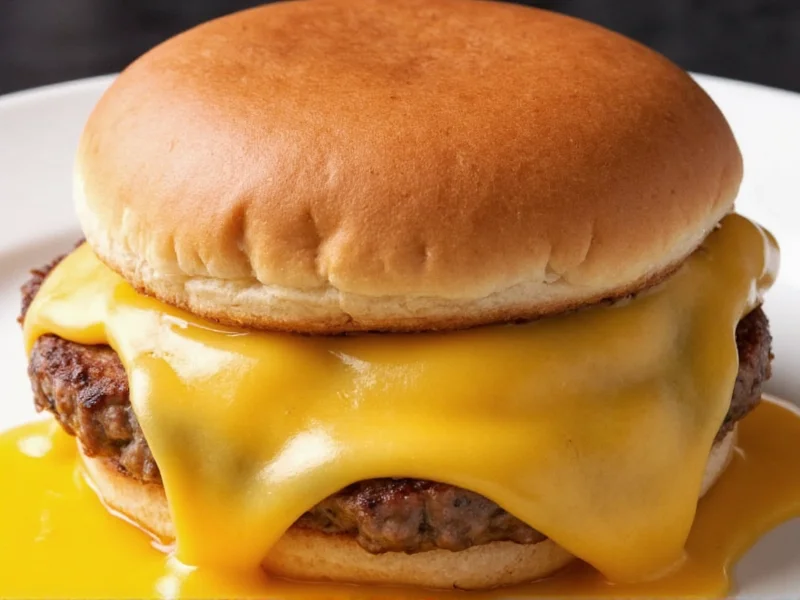Understanding the nutritional profile of fast food breakfast items is essential for making informed dietary choices. The Sausage Egg and Cheese McGriddle represents a common menu option that many consumers enjoy for its convenience and taste, but its nutritional content warrants careful consideration for those monitoring their daily intake.
| Nutrient | Amount | % Daily Value* |
|---|---|---|
| Calories | 550 | 28% |
| Total Fat | 32g | 41% |
| Saturated Fat | 12g | 60% |
| Trans Fat | 0.5g | - |
| Cholesterol | 185mg | 62% |
| Sodium | 1,290mg | 56% |
| Total Carbohydrates | 42g | 15% |
| Dietary Fiber | 2g | 7% |
| Sugars | 6g | - |
| Protein | 24g | - |
*Percent Daily Values are based on a 2,000 calorie diet. Your daily values may be higher or lower depending on your calorie needs.
Breaking Down the Sausage Egg and Cheese McGriddle Nutrition
The calorie composition of the Sausage Egg and Cheese McGriddle comes primarily from three components: the sausage patty, the egg, and the maple-flavored griddle cakes that serve as the "bun." Each element contributes significantly to the overall nutritional profile.
The sausage patty alone accounts for approximately 300 calories, with 24g of fat (9g saturated). The egg adds about 90 calories with minimal fat content, while the two griddle cakes contribute 280 calories, primarily from carbohydrates. When combined, these elements create a breakfast sandwich that delivers substantial protein but also contains high levels of saturated fat and sodium.
How This Fits Into Daily Nutritional Goals
For someone following a standard 2,000-calorie diet, the Sausage Egg and Cheese McGriddle represents about 28% of daily calorie needs. More concerning is that it provides 60% of the recommended daily limit for saturated fat and 56% of the recommended sodium intake. The American Heart Association recommends limiting saturated fat to no more than 13g per day and sodium to 2,300mg or less.
While the 24g of protein makes this a relatively satisfying breakfast option that may help with satiety, the high sodium and saturated fat content means it shouldn't be a regular part of a heart-healthy diet. Those monitoring their cholesterol should note the 185mg content, which represents over 60% of the recommended daily limit.
Comparing to Other Breakfast Options
When evaluating sausage egg and cheese mcgriddle calories against similar menu items, several comparisons emerge:
- McDonald's Sausage McMuffin with Egg: 480 calories, 30g fat
- Starbucks Bacon, Gouda & Egg Sandwich: 500 calories, 27g fat
- Chick-fil-A Egg White Grill: 290 calories, 9g fat
- Homemade vegetable omelet (2 eggs with vegetables): Approximately 250 calories, 15g fat
These comparisons show that while the McGriddle provides more protein than some alternatives, it also contains significantly more calories and fat than lighter breakfast options. For those specifically searching for sausage egg and cheese mcgriddle nutrition facts to compare with homemade alternatives, the difference in nutritional quality becomes even more pronounced.
Customization Options to Reduce Calories
McDonald's offers several modification options that can reduce the calorie count of this popular breakfast sandwich:
- Order without cheese: Reduces calories by approximately 70 and fat by 6g
- Request egg whites instead of whole egg: Saves about 50 calories
- Ask for no butter on the griddle cakes: Eliminates approximately 45 calories
- Pair with a side of fruit instead of hash browns for a more balanced meal
These modifications can bring the total calories down to around 400-450 while still providing a satisfying breakfast. For those tracking sausage egg cheese mcgriddle calories for weight management purposes, these small changes can make a meaningful difference over time.
Dietary Considerations for Different Goals
The appropriateness of including a Sausage Egg and Cheese McGriddle in your diet depends significantly on your specific health and fitness objectives:
For weight loss: At 550 calories, this represents a substantial portion of a typical weight loss diet (1,200-1,500 calories/day). Occasional consumption might fit within a calorie budget, but regular inclusion would likely hinder progress. Those specifically searching for how many calories in a sausage egg and cheese mcgriddle while dieting should consider it an occasional treat rather than a staple.
For muscle building: The 24g of protein makes this a reasonable post-workout option when consumed shortly after exercise, though the high saturated fat content isn't ideal for optimal recovery. Pairing it with additional vegetables would improve the nutritional profile.
For heart health: The high saturated fat and sodium content make this a poor choice for those managing cardiovascular conditions. The American Heart Association would likely recommend against regular consumption of items with this nutritional profile.
Reading Between the Lines of Nutrition Information
When examining sausage egg and cheese mcgriddle nutritional information, it's important to look beyond just the calorie count. The quality of those calories matters significantly. While the protein content supports satiety and muscle maintenance, the high levels of processed ingredients, sodium, and saturated fat mean this isn't providing optimal nutrition.
Nutrition scientists emphasize that whole, minimally processed foods generally provide more balanced nutrition with fewer negative health impacts. The McGriddle's combination of processed meat, refined carbohydrates, and added fats represents what many health professionals classify as "ultra-processed" food.
For those wondering is sausage egg and cheese mcgriddle healthy, the answer depends on context. As an occasional breakfast option, it's unlikely to cause harm. As a regular part of one's diet, it could contribute to negative health outcomes over time, particularly for those with pre-existing cardiovascular concerns.











 浙公网安备
33010002000092号
浙公网安备
33010002000092号 浙B2-20120091-4
浙B2-20120091-4